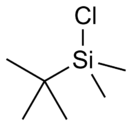Chemistry:Tert-Butyldimethylsilyl chloride

| |
| Names | |
|---|---|
| Preferred IUPAC name
tert-Butyl(chloro)di(methyl)silane | |
| Identifiers | |
3D model (JSmol)
|
|
| ChEBI | |
| ChemSpider | |
| EC Number |
|
PubChem CID
|
|
| UNII | |
| |
| |
| Properties | |
| C6H15ClSi | |
| Molar mass | 150.72 g·mol−1 |
| Appearance | white solid |
| Odor | pungent, grassy |
| Melting point | 86–89 °C (187–192 °F; 359–362 K) |
| Hazards | |
| GHS pictograms |  
|
| GHS Signal word | Danger |
| H228, H314 | |
| P210, P240, P241, P260, P264, P280, P301+330+331, P303+361+353, P304+340, P305+351+338, P310, P321, P363, P370+378, P405, P501 | |
Except where otherwise noted, data are given for materials in their standard state (at 25 °C [77 °F], 100 kPa). | |
| Infobox references | |
tert-Butyldimethylsilyl chloride is an organosilicon compound with the formula (Me3C)Me2SiCl (Me = CH3). It is commonly abbreviated as TBSCl or TBDMSCl. It is a chlorosilane containing two methyl groups and a tert-butyl group. As such it is more bulky that trimethylsilyl chloride. It is a colorless or white solid that is soluble in many organic solvents but reacts with water and alcohols. The compound is used to protect alcohols in organic synthesis.[1]
tert-Butyldimethylsilyl chloride reacts with alcohols in the presence of base to give tert-butyldimethylsilyl ethers:[2][3]
- (Me3C)Me2SiCl + ROH → (Me3C)Me2SiOR + HCl
These silyl ethers hydrolyze much more slowly than the trimethylsilyl ethers.
It also can silylate terminal alkynes.[4]
Related reagents
The triflate derivative (Me3C)Me2SiOTf is used similarly but is more reactive.[5][6]
References
- ↑ Bret E. Huff; Wenming Zhang (2008). "t‐Butyldimethylchlorosilane". EROS. doi:10.1002/047084289X.rb373.pub2. ISBN 978-0-471-93623-7.
- ↑ Bajwa, Joginder S.; Prasad, Kapa; Repic, Oljan (2006). "2-(2',2'-Dimethylpropoxy)-2,3-Dihydro-1H-Indene". Organic Syntheses 83: 155. doi:10.15227/orgsyn.083.0155.
- ↑ Paquette; Heidelbaugh, Todd M. (1996). "tert-Butyldimethylsiloxy-2-cyclopenten-1-one". Organic Syntheses 73: 44first1=Leo A.. doi:10.15227/orgsyn.073.0044.
- ↑ Marshall, James A.; Yanik, Mathew M.; Adams, Nicholas D.; Ellis, Keith C.; Chobanian, Harry R. (2005). "Generation of Nonracemic 2-(t-Butyldimethylsilyloxy)-3-butynyllithium from (S)-Ethyl Lactate". Organic Syntheses 81: 157. doi:10.15227/orgsyn.081.0157.
- ↑ Dondoni, Alessandro; Perrone, Daniela (2000). "Diastereoselective Synthesis of Protected Vicinal Amino Alcohols: (S)-2-[(4s)-n-tert-butoxycarbonyl-2,2-dimethyl-1,3-oxazolidinyl]-2-tert-butyldimethylsiloxyethanal from a Serine-Derived Aldehyde". Organic Syntheses 77: 78. doi:10.15227/orgsyn.077.0078.
- ↑ "tert-Butyldimethylsilyl ethers". https://www.organic-chemistry.org/protectivegroups/hydroxyl/tbdms-ethers.htm.
 |

